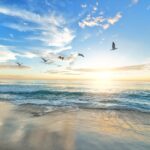Creativity development: Education for sustainable development

Sustainable learning concepts taking into account long-term effects. „Learning in the Blue Classroom“ – happiness and finding meaning – in conversation with Thomas Friese, real estate developer from Oldenburg and Berlin.
The natural-scientific material instruction is important for the understanding and in the application of the learned. The development of creativity with sustainable learning goals as a teaching philosophy „Education for sustainable development“ as an aid for children, young people and adults for decision-making, with the assessment of their own actions. Education is the key to changing the world for the better. In other words, how do one’s actions affect future generations and global life. „Education for sustainable development is found in all industries, including real estate. The European Union is leading the way with the European Green Deal, and the real estate industry is also undergoing change. Topics such as sustainability, cradle-to-cradle, energy efficiency, recyclability, natural building materials, for example, are enabling a shift in thinking towards sustainability,“ explains Thomas Friese from Oldenburg, who has been developing real estate projects throughout Germany for decades.
Blue classroom – sustainable learning directly in nature and from nature
On the North Sea coast of Lower Saxony in the district of Cuxhaven, the „Blue Classroom“ has been established according to the principles of education for sustainable learning. For more than 10 years, numerous activities for students and groups have been taking place on the beaches in Döse and Duhnen from June to August. Thomas Friese on this: „On the subject of development tasks make happy, this is an excellent example. In nature playfully get to know the Wadden Sea World Heritage Site, as teaching units in two time hours feel and experience how nature works on the coast with low tide and high tide.“
The teaching philosophy is based on the motto of Antoine de Saint Exupéry (The Little Prince): „If you want to build a ship, don’t drum up men to procure wood, assign tasks and divide up the work, but teach them to long for the wide, endless sea“.
Cuxhaven has taken the lead with the „Blue Classroom“. The impetus for the „Blue Classroom“ was the three-day Ecology, Sea, Environment and Health Fair (ÖMUG), which was held in Cuxhaven in 1997. At that time, the concept of the „Blue Classroom“ was created to draw attention to the subject of the Wadden Sea, the fauna and flora at the northernmost tip of Lower Saxony. In addition, a comprehensive exhibition with more than 60 animal and plant exhibits on the diversity of the Wadden Sea was created, as well as the possibility to take over a sponsorship for grey seals and awards for the „Blue Classroom“ with the theme „Keep`the world in balance“ followed. This example shows the central importance for lifelong learning as education for sustainable and the intersection for global economic development“, Thomas Freise points out.
Responsibility for the sea as a habitat
The coastal regions on the North Sea and Baltic Sea and the Wadden Sea National Park are under special protection and the Wadden Sea is a UNESCO World Heritage Site. „Not only for the children and youth, the Blue Classroom should be an opportunity for understanding and knowledge of the sensitive interaction in nature. Discussed is the change to sustainability not only in the tourism industry around the Wadden Sea National Park, but also in the real estate industry. Learning ability in relation to the lastingness for new project developments, like in Duhnen, Cuxhaven, where on the former Sweden home property a quarter solution for age-fair living with nursing facility and quarters with permanent and vacation homes are to be realized, are examples of lifelong learning, outgrown from the blue classroom“ , explains real estate expert Thomas Friese. Under the motto, together we are in the boat, the Trilateral Wadden Sea Cooperation, consisting of 16 members of the trilateral working group, has set itself a common goal. It focuses on development strategies for sustainability with transboundary responsibility in the field of nature conservation Wadden Sea National Park. Across national borders with information exchange, further education and training, qualification and assumption of responsibility as an active approach to jointly develop sustainable solutions.
V.i.S.d.P.:
Moritz Roland Bausch
OTA Training & Blogger
About the author:
Moritz Bausch, a graduate of the English boarding school Rossall School in Fleetwood, Great Britain, with the International Baccalaureate Diploma (IB). Moritz is currently in vocational training OTA in healthcare. He is particularly interested in the transformation of healthcare – with human health at the forefront – through technology, digitalization and artificial intelligence to holistic A-Z health.
About Thomas Friese:
The real estate expert and project developer Thomas Friese, Berlin/Oldenburg (Lower Saxony) is active a training in the fiscal range since in the middle of the seventies in the range real estate development and marketing.
PRESSEKONTAKT
Projektentwickler & Immobilienexperte
Thomas Friese
Unter den Eichen 108a
12203 Berlin
Website: https://web.facebook.com/thomas.friese.100
E-Mail : frieseberlin@aol.com
Telefon: +49 172 3801981